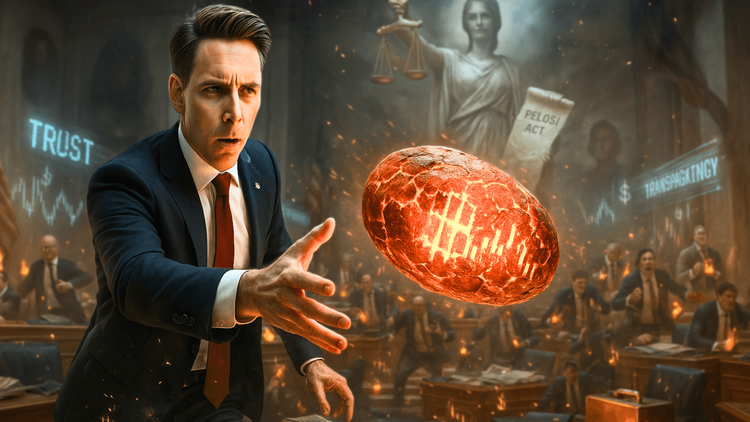Big Pharma’s New Pill to Swallow: Trade Wars
Pfizer’s CEO Albert Bourla challenges Washington’s tariff plans, urging smarter solutions like tax incentives to secure U.S. pharma dominance.

Pfizer CEO Albert Bourla isn’t mincing words. As the Biden-to-Trump transition heats up on trade, he’s making it clear: pharmaceutical tariffs are the wrong medicine for America’s future. On a recent earnings call, Bourla confronted the rising anxiety over a possible 25% tariff on pharmaceutical imports — a decision still lingering on the White House desk. While he acknowledged the legitimacy of national security concerns driving the discussion, he didn’t hedge his position. “We should not have tariffs,” he declared firmly.
In a moment where global supply chains are tightening and geopolitical risks are rising, Bourla’s comments come with more than just fiscal implications — they’re a strategic warning. "No country wants to have critical medicines produced... in countries where tensions are high or can escalate," he emphasized. The message was loud and clear: Pfizer understands the risks but believes tariffs are a blunt instrument for a delicate situation. And with uncertainty hanging in the air, Bourla wants clarity — not conflict — from Washington.
Even as the political pressure mounts, Pfizer is not standing still. Bourla revealed that the company already has contingency plans to minimize any blowback from tariffs, should they be imposed. But what he really wants isn’t a workaround — it’s a commitment to a smarter path forward. "If there are tariffs, we have detailed contingency plans that are minimizing the impact," he said, before underscoring, "But I'm right now focusing more on the fact that we should not have tariffs."
CFO David Denton added fuel to the fire, noting that Pfizer is already expecting a $150 million hit in 2025 from the current range of tariffs, even before new ones are considered. He remained tight-lipped on which products are directly impacted but confirmed that the financial toll is already real and growing. The concern is not just about cost — it’s about planning. Tariffs, in their very nature, inject volatility into long-term strategy.
Bourla hinted at what’s really at stake: the opportunity to scale U.S. investment. In his view, the Trump administration holds the keys to unlocking a new era of domestic manufacturing and research — but only if it ditches the tariff talk. "If I know there will not be tariffs, and I have certainty, then there are tremendous investments that can happen in this country," he said. It’s not just a plea; it’s a proposition. With the right environment — one of stability, not taxation — Bourla is ready to inject serious capital into U.S. soil.
His argument echoes a broader sentiment among global pharmaceutical leaders. AstraZeneca CEO Pascal Soriot voiced a similar view, advocating for "an attractive corporate tax rate" as the true lever to pull if the U.S. wants more local production. Tariffs, in contrast, are viewed as a short-sighted move that could disrupt global pipelines without solving core issues.
Bourla doesn’t dismiss the security questions altogether. In fact, he gave credit to the Trump administration for pursuing an investigation into pharmaceutical vulnerabilities as a matter of national interest. He acknowledged he’s been engaged in "very productive discussions with all Secretaries involved, and White House staff," and expressed confidence that those concerns can be resolved through smart policy — not punitive fees.
The CFO reiterated that Pfizer is taking a proactive stance, not a reactive one. They are managing inventory, leveraging their U.S.-based facilities, and even considering shifting active pharmaceutical ingredient (API) production back to the States. Still, all of these moves come at a cost — and it’s a cost they’d prefer not to pass on to consumers.
Bourla’s stance is pragmatic, but it’s also political. With Trump’s economic playbook under scrutiny, the pharmaceutical sector finds itself once again at the center of an industrial policy debate. During Trump’s first term, tax cuts under the 2017 Tax Cuts and Jobs Act provided a major incentive for companies like Pfizer to bring investment back home. Bourla points to that moment as proof that positive incentives work. And he hinted that another round of tax relief could do far more than any trade barrier ever could. "He would like to see even a reduction in the current tax rates, in particular for locally produced goods," Bourla said, referencing his conversations with Trump directly.
As markets responded to the news, Pfizer’s stock gained 3.73%, climbing to $23.91. It’s a modest bump, but one that suggests investors are paying attention. Uncertainty may be the theme of the day, but Bourla’s clear message cuts through the noise. If the U.S. wants to secure its pharmaceutical future, it shouldn’t start with tariffs — it should start with trust, tax reform, and strategic foresight.
At a time when health systems are still healing from COVID-era fractures and global supply chains remain fragile, the wrong policy could do more harm than good. Bourla’s prescription? Ditch the tariffs, double down on domestic investment, and let the science — not the politics — lead.
Conclusion
Albert Bourla is offering Washington a deal: trade certainty for investment. His message is not anti-American — it's pro-logic. With national security top of mind, no one is ignoring the risks of global dependence. But introducing a 25% tariff on critical medicines isn’t a fix — it’s a risk multiplier. The pharmaceutical industry needs clarity, not chaos. Bourla’s plan is simple: leverage smart tax policy, invest in local manufacturing, and work with — not against — the global system. Tariffs may make headlines, but they won’t cure the underlying problems. Pfizer, and its CEO, are betting on strategy over sentiment.





